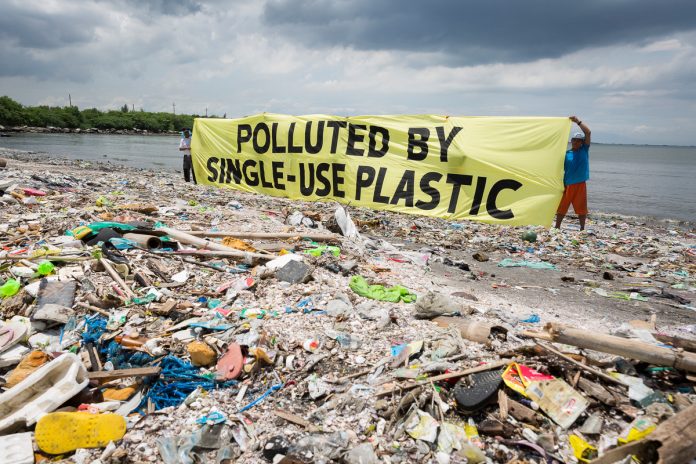Greenpeace Philippines has raised alarm over the government’s approval of plastic waste use in national road construction, warning that the move could worsen the country’s plastic pollution and public health crises.
The Department of Public Works and Highways (DPWH) on Monday announced it has approved the use of polyethylene terephthalate (PET) plastic bottle waste as an additive in asphalt to enhance the stability and extend the lifespan of paved roads.
The policy builds on the agency’s 2024 initiative that incorporated low-density polyethylene (LDPE) plastic bag waste in road projects.
DPWH Secretary Manuel Bonoan signed a department order formalizing the new standard, dubbed Item 310 (19), which will now form part of the DPWH Standard Specification for Highways, Bridges, and Airports Volume II.
The material will be used in future infrastructure projects by regional offices, the Unified Project Management Office Clusters, and District Engineering Offices across the country.
“Turning waste into valuable resource for building better and more roads is the future of public infrastructure development in the country,” Bonoan said. “The public can expect more of these policies as we vow to continue to fund for this construction innovation.”
The agency said the initiative aligns with President Ferdinand Marcos Jr.’s push for resilient and sustainable infrastructure.
Environmental watchdog Greenpeace, however, denounced the policy as “greenwashing” and a dangerous distraction from meaningful solutions to the plastic crisis.
“We shouldn’t depend on false solutions. The use of plastic waste in building and maintaining our roads is not a solution to the plastic pollution crisis, nor is it a sustainable and safe option. This only creates more problems for the environment and public health,” said Marian Ledesma, Zero Waste Campaigner for Greenpeace Philippines.
Ledesma cautioned that roads deteriorate over time, which could lead to the release of toxic chemicals and microplastics into surrounding ecosystems.
“When you take into account the wear and tear that our roads undergo, as well as exposure to the sun and other elements, plastic waste in building roads can be potentially harmful,” she said.
Greenpeace warned that plastics used in road construction may release harmful substances, including so-called forever chemicals, which pose health risks to nearby communities and contribute to microplastic pollution in the environment.
“The chemicals in plastic are not only linked to cancer, heart disease, other health conditions and deaths, but they can also bioaccumulate in soil, plants and animals—eventually reaching people through our food,” said Ledesma. “In the same manner, emissions of microplastics can add to water and air pollution, which can also contaminate our food system.”
Ledesma raised concerns about the structural reliability of using plastic waste in construction, warning that it may compromise the integrity of concrete structures.
She argued that incorporating plastics into infrastructure only amplifies the broader environmental and health impacts associated with plastic production, including greenhouse gas emissions, toxic pollutants, and chemical exposure.
Greenpeace urged the government to pursue genuine, long-term solutions to the plastic crisis. These include reducing plastic production at the source, implementing bans on single-use plastics, and promoting reuse systems that do not generate waste.
The group warned against institutionalizing approaches that merely appear sustainable while creating new environmental and public health risks.









